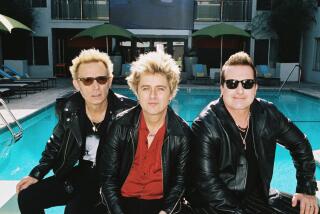Rancid’s ‘Let the Dominoes Fall’ feels like a punk homecoming
- Share via
When Tim Armstrong’s brother Greg first returned from military service in Iraq, the Rancid frontman knew something was wrong. After all he’d seen in the war, Greg couldn’t relate to his family and friends the way he used to, and Armstrong could tell that the pain of re-integrating into civilian life had created a gulf between them.
So Armstrong wrote a love song for Greg, telling his brother through his lyrics that even if “the war seems to follow (him) home,” there’s still hope to one day “fix up them old cars and ride them into the sun.”
“When we went into Iraq, our country wasn’t at war, 150,000 military families were,” Armstrong said, leaning in across a crouch inside the Los Angeles offices of Epitaph Records, the band’s longtime label. “It’s hard to talk about, so this is my way of telling my family that I love them. When I played this song for my dad, he was in tears.”
The stark and tender folk track “Civilian Ways” is on Rancid’s new release, “Let the Dominoes Fall,” which came out Tuesday, and it’s a quiet centerpiece to an album about returns -- of a soldier from war, of a country from eight years of the Bush presidency and from Rancid’s own six-year hiatus.
During that time the band members tried out solo projects, doing albums that included rap crew side projects and mainstream pop collaborations. But after more than a half-decade apart musically, the East Bay quartet is ready to reclaim its singular sound.
As Green Day, the group’s onetime peers in Berkeley’s Gilman Street punk scene in the ‘80s and ‘90s, issues its second arena-sized rock opera, “21st Century Breakdown,” Rancid’s “Dominoes” offers a prickly blend of humid dub reggae and late-’70s punk that doesn’t stray too far from early ‘90s hits like “Time Bomb” and “Ruby Soho,” songs that vaulted the band into the pop consciousness.
“All the records have their own particular smell about them, and they smell the same way today as they did in ‘95,” said guitarist and singer Lars Frederiksen. “We’ve been a band for a long while and it’s hard to ignore that. But this is the beginning of the next 17 years.”
--
New landscape
Punk has changed dramatically around Rancid in the last decade, grafting elements of pure pop, prog-rock, metal and electronica onto its three-chord skeleton. Yet “Dominoes” feels more like a timely homecoming than a genre exercise. The first single, “Last One to Die,” is Rancid’s equivalent of a rap veteran’s boast track, with barroom harmonies reminding doubters that “We sit on top of the world / And we’re proving it every night.”
Many of “Dominoes” best songs have a surprisingly tender sense of nostalgia about them, both for the band’s East Bay roots and the kindred spirits they’ve met in their years touring. “East Bay Night” is a fuzz-soaked travelogue of the Rancid’s hometown ne’er-do-welling.
The “boom-shacka-lacka” catcall of “L.A. River” (courtesy of bassist Matt Freeman, who evokes an evil Louis Armstrong) befits the river’s tagged-up bleakness and “New Orleans” finds unexpected redemption in the fraught city.
“New Orleans is such a mecca for music, food, voodoo, everything,” Frederiksen said. “I grew up poor and I know what it feels like to be forgotten. So this is our love song to New Orleans.”
While Rancid wears its hardscrabble roots on its sleeve (or, in Armstrong and Frederiksen’s cases, as sprawling tattoos on their scalps and faces), the musicians’ pop instincts and commercial successes have afforded them the opportunities of a much slicker mainstream rock act. The band recorded parts of “Dominoes” at George Lucas’ Skywalker Sound Studio, where spider web body art isn’t quite so typical.
“We snuck into one of the screening rooms where they were playing ‘Wall-E’ one night, and these guys in really nice suits sat next to us, looked us over and told us to get the heck out,” Armstrong said.
Armstrong, though, has demonstrated a certain level of comfort with the more corporate-friendly confines of the pop world. Rancid’s last album, 2003’s major label debut “Indestructible,” arrived concurrent with the singer Pink’s “Try This,” which Armstrong had a heavy hand in writing.
The band’s new single, “Last One to Die,” also showcases Armstrong’s more commercial instincts -- it might be Rancid’s most accessible track to date.
But Rancid songs always have been built on big, immediate melodies, and Armstrong hasn’t lost the leonine stage presence that can command a basement circle pit or a packed Verizon Wireless Amphitheater, as when the band headlined KROQ’s Weenie Roast last month.
“If you listen to ‘. . . And Out Come the Wolves,’ every song is so easy to sing along to,” said Skye Sweetnam, the young Canadian pop singer who contributed the hook to “Into Action,” from Armstrong’s easygoing 2007 solo album, “A Poet’s Life.” “When we were writing, Tim played me his really old punk records, and the common thread is that all of it has really good hooks.”
--
A model for success
For drummer Branden Steineckert, who joined up with Rancid after leaving the emo outfit the Used, the band has been a model for how punk can be popular without losing its values.
“I like raw, organic musicianship, and making this album is what really connected me to how I’ve always felt about music.”
That philosophy has helped Rancid transition from a group of childhood friends to elder statesmen of an ever-evolving genre. Armstrong, 42, believes that even if the lessons of punk come early in life, they stay with you into the far side of 40 and can make a longtime band feel like a family.
“When I first met Ian MacKaye [of Minor Threat and Fugazi], I asked him for advice. He told me to start a band with my homies,” Armstrong said. “I’ll ask kids in younger bands, ‘Do you want to know the Rancid plan for success?’ They’ll say, ‘Yeah!’ and I’ll tell them this -- ‘There is no plan. Just be creative with your brothers.’ ”
--
More to Read
The biggest entertainment stories
Get our big stories about Hollywood, film, television, music, arts, culture and more right in your inbox as soon as they publish.
You may occasionally receive promotional content from the Los Angeles Times.











